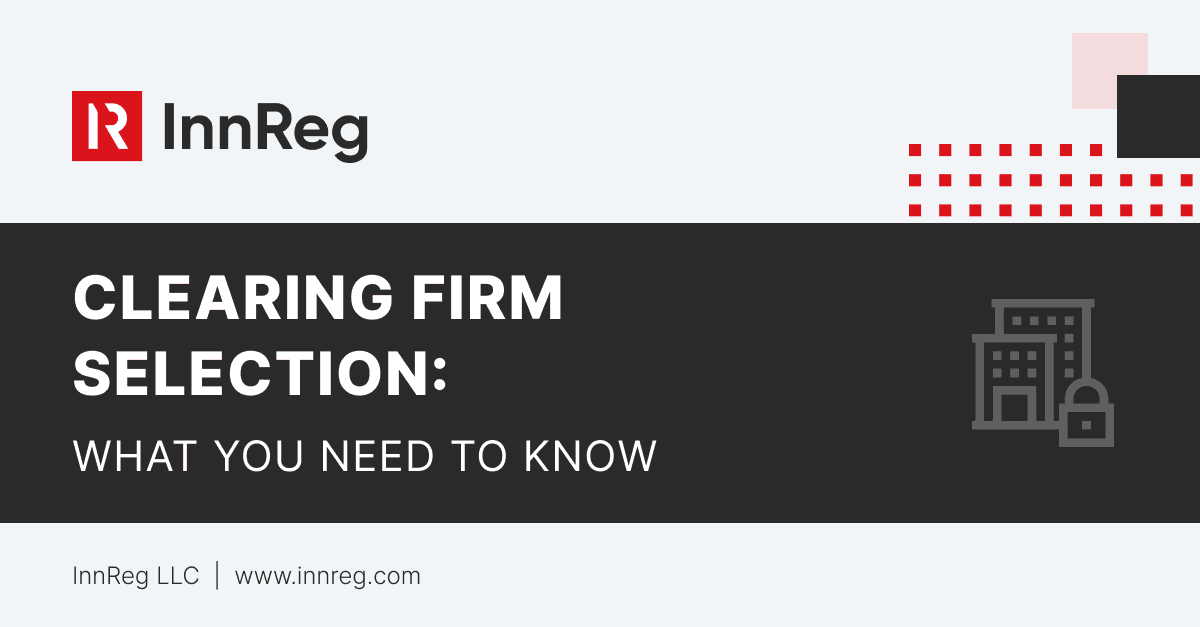Contents
Choosing a clearing firm is one of the most consequential choices a new digital broker-dealer can make. InnReg evaluates clearing firms using six essential criteria. How can you make sense of the pros and cons in such a high-stakes situation? Here’s how we help our clients navigate this complex process.
See also:

InnReg is a global regulatory compliance and operations consulting team serving financial services companies since 2013. If you need assistance with compliance or fintech regulations, click here.
Choices and implications
Clearing firms provide the underlying glue to transactions between end users of brokerage platforms and the securities markets.But they are not all created equal. Broker-dealers need to pay special attention to choosing a clearing firm, as it represents the most important component of its operational and technology stack.
At InnReg, we specialize in supporting innovative, technology-based broker-dealers. We consider six dimensions of what a clearing firm may offer our digital broker-dealer clients, and strongly advise them to consider those factors in their choice.

1. Your Clearing Firm’s Compliance Track Record
We always tell clients that the clearing firm’s own internal compliance processes should be the primary area of focus. No one should take these for granted.
Due diligence to confirm any regulatory complaints and actions against a candidate clearing firm (such as via FINRA BrokerCheck) must come first. The raw number of issues matters less than the existence of a pattern of SEC or FINRA issues pertaining to a specific area of compliance.
2. Cost, Revenue-Model Options, and Fee Structures
For newer entities, clearing firms built to serve institutional or high-net-worth segments may simply be too costly.
Just as important, many of the more established players are wrestling with migrating from legacy systems to more modern technologies or may take a more conservative approach to the types of business models they will support. There is a reason that such players are seen as the major industry incumbents, and I have great respect for the capabilities they offer.
Paradoxically, larger firms’ strengths may make them a rougher fit for the specific objectives of a technology-first broker-dealer. Factors such as commissions, fully-paid lending, interest sharing, payment for order flow, and trade bunching contribute to the total value of the relationship with a clearing firm.
We advise clients to go beyond simple cost comparisons to see both cost of ownership and return on investment in the clearing firm relationship.
3. Transparency
Does the clearing firm offer end-to-end visibility in any given aspect of the service provided, and to the extent that you need? Does that visibility support compliance with broker-dealers’ regulatory requirements, and help execute on mid- and back-office responsibilities with the speed and efficiency that end users expect? Does it provide Know Your Customer visibility across all transactions, and validate any efforts to achieve air-tight prevention of money laundering?
Broker-dealers need unambiguous answers to all of these questions.
4. Underlying Technology
Technology leaders can offer transaction data directly to a broker-dealer’s systems, in or near real-time, via modern, easily consumable APIs (Application Programming Interfaces). In simple terms, these allow the clearing firm’s services to be consumed by systems and applications seamlessly.
More modern APIs do so in real time. Some will be a better fit for a given broker-dealer’s systems than others, and some may not be able to support a sophisticated technology integration to the degree that is needed.
Furthermore, clearing firms vary widely in the level of automation they support. If their internal trade processing is highly manual, they cannot effectively support a digital correspondent. Conversely, others offer full, turnkey automation.
However, the advantages of a nearly instantaneous deployment come at a cost. Ready-to-go white label platforms usually are accompanied by the inability to be customized. This constrains correspondents’ flexibility to offer the desired user experience to end users.
It is important to tread carefully when looking at the true implications of a clearing firm’s automation capabilities no matter how attractive they seem.
5. Service Model
Does your clearing firm offer compliance tools and integrated alerts, high-quality, meaningful and understandable reporting, and a human being to contact when things go wrong? Does it proactively communicate system or business process issues?
Service levels can, of course, be a trade-off with fees, but it is important to ask the hard questions about exactly what will happen during service issues, interruptions, and failures. These have a direct impact on a broker-dealer’s operations, and the ability to create responses and continuity plans on which they can truly rely.
Risk culture considerations sit alongside that service model analysis. Broker-dealers must also be sure that a clearing firm's risk appetite supports the level of innovation in their business model. It can often be the case that the largest institutional firms have an enormous amount of capital, but it comes with constraints on the ability to offer innovative options to end clients.
6. Longevity and Switching Costs
In theory, a clearing firm that can evolve is a better option. As broker-dealers grow in size, in the scope of investment options you offer, and more, they need greater sophistication.
In practice, switching clearing firms is not uncommon. Some broker-dealers even switch to a self-clearing model if they have the scale and resources to do so.
While switching can occur, it is nevertheless not easy or inexpensive. The process of vetting, selecting, and negotiating terms will take time and internal resources. Going through a new integration process between your technology and the clearing firm’s comes with both cost and complexity.
While changing clearing firms is a logical element of any growing broker-dealer scenario planning, it should not be taken lightly.
—
In summary, the many dimensions and implications of choosing a clearing firm require a significant degree of clarity. Our approach at InnReg places a strong eye on compliance and operations readiness, because clearing activities lay at the heart of a broker-dealer business model.
If you have any questions about choosing or switching clearing firms, we’d welcome you to be in touch to start the conversation.
How Can InnReg Help?
InnReg is a global regulatory compliance and operations consulting team serving financial services companies since 2013.
We are especially effective at launching and scaling fintechs with innovative compliance strategies and delivering cost-effective managed services, assisted by proprietary regtech solutions.
If you need help with broker-dealer compliance, reach out to our regulatory experts today:
Published on Jul 4, 2019
Last updated on Dec 2, 2023
Related Articles
Latest LinkedIn Posts













